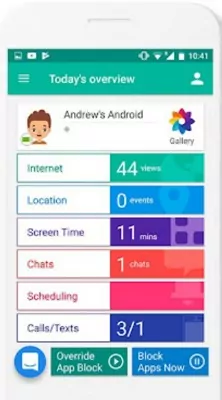The Ultimate Guide to Free Parental Control Apps for Android
Welcome, tech-savvy parents! In today’s digital age, safeguarding our children’s online experience is more critical than ever. As a bonus, we don’t always have to break the bank to do so. Free parental control apps for your Android devices are a fantastic way to start protecting your little ones from the risks of the digital world. In this comprehensive guide, we will explore the best free parental control apps designed for Android, helping you make an informed decision on which is right for your family.
Why Parental Control Apps are Necessary
In a time where children are getting their hands on smart devices at an increasingly early age, it’s essential to ensure they’re moving through cyberspace safely. Parental control apps help by allowing you to monitor your child’s online activity, limit screen time, block inappropriate content, and even track their location. These tools are not just about control; they’re about educating and setting boundaries that help kids navigate online spaces responsibly.
Understanding Android’s Built-In Parental Controls
Before we jump into third-party applications, it’s essential to understand that Android does have built-in parental controls. Google’s Family Link app is a free service that lets you set certain digital ground rules for your family. With it, you can manage the apps your child can use, keep an eye on their screen time, and even lock their device remotely. While Google’s solution is quite robust, you may find that you need additional features that third-party apps can provide.
Features to Look For in a Free Parental Control App
- Screen Time Management: To help maintain a healthy balance between screen time and other activities, look for an app that enables you to set daily limits and schedules.
- App and Game Blocking: With the ability to block downloads or usage of inappropriate apps and games, you can keep your child from being exposed to content that’s not suitable for their age.
- Web Filtering: The internet is vast, and not all of it is child-friendly. A good parental control app will offer web filtering to restrict access to adult content or sites that you don’t approve of.
- Location Tracking: For peace of mind when your children are on the go, choose an app that includes location tracking features.
- Usage Reports: Understanding your child’s device habits can help you make better decisions about their digital health, so opt for apps that provide comprehensive usage reports.
Top Free Parental Control Apps for Android
Let’s explore some of the top parental control apps you can start using today, without spending a dime:
- Google Family Link: We’ve mentioned this one already, but it’s worth repeating. This is a staple for Android users seeking to supervise their child’s Google account and device usage.
- Kaspersky Safe Kids: This app features a range of parental controls, including screen time management, app use regulation, and website filtering. The free version offers a solid suite of tools to get you started.
- Norton Family Parental Control: While Norton is well-known for its security software, its parental control options are also worth considering. With features like location tracking and app supervision, the free version can be an excellent starting point.
- Screen Time: Not to be confused with Apple’s offering with the same name, this app specializes in managing and monitoring the amount of time your child spends on their device.
Choosing the right parental control app is an important decision that can affect your child’s digital experience. In the following sections, we will delve deeper into the specifics of each recommended app, compare the pros and cons, and provide straightforward tips on setting up and effectively using these tools to create a safer digital environment for your child.
Stay with us as we unpack the digital parenting puzzle—one app at a time, ensuring your family’s online adventures are not just fun, but also secure and appropriately tailored to your child’s age and maturity level. With the right controls in place, you can rest a little easier and allow your child to explore, learn, and connect in this vast digital landscape.
Now, let’s take a closer look at each of these free parental control apps and find out which one might be the perfect fit for your family in our next section!

5 Things Parents Should Know in Preparing for Free Parental Control Apps on Android
Before diving into the digital ocean with a parental control app, there are a few things every parent should be aware of:
- Compatibility and Requirements: It’s important to ensure the compatibility of the parental control app with your child’s device. Check the operating system requirements of the app and see whether it’s designed to work smoothly with your Android version.
- Privacy and Security: The privacy and security of your child’s data are paramount. Always review the privacy policies of the apps to understand how your child’s data will be collected, used, and protected.
- Involve Your Children: Open communication is key. Discuss with your child why you are using a parental control app. Involving them in the process can help them understand the importance of safe online habits and respect the boundaries set by the app.
- Balance Between Monitoring and Trust: While parental control apps are great for keeping children safe, it’s also important to find a balance. Too much control can lead to trust issues. Find a healthy balance that fits with your family’s values and your child’s maturity level.
- Regularly Update Settings: As your child grows, their digital needs and the online landscape will change. Regularly revisit the app’s settings to update any restrictions and ensure that they are still appropriate for your child’s age and development.
Understanding these critical aspects will equip you to make better choices and set up a safe, yet flexible digital environment catered to your family’s needs.
Armed with this knowledge and the detailed overview of each free parental control app we’re about to dive into, you’re well on your way to becoming a pro at digital parenting. Ready to keep your child’s digital journey safe? Let’s evaluate these apps more closely!
Evaluating Google Family Link for Parental Control
Starting with the inbuilt option from Android, Google Family Link sets a solid foundation for parental controls. It’s seamless to set up with your child’s Google account and offers a comprehensive set of tools that cater to the needs of most parents. Let’s dissect its key features:
- Application Management: Control the apps your child can download and use, and even approve or block them remotely.
- Screen Time Supervision: Monitor how much time your child spends on their device, set daily limits, and bedtime schedules to ensure they’re not staying up late on their gadgets.
- Device Location: Stay in the know of your child’s whereabouts with location tracking, ideal for parents with kids who are starting to explore a little more on their own.
- Remote Device Lock: Nifty for those moments when you need to enforce some offline time, you can lock your child’s device remotely, ensuring they’re focusing on homework or family time.
For those who seek a straightforward, no-cost option that integrates well with Android, Google Family Link is a strong candidate. But let’s not stop here! There are more apps to explore, and the perfect one for your family might just be a few paragraphs away. Remember, it’s not just about what an app can do; it’s about what your family needs to make the digital world a welcome addition to your child’s development.
Let’s continue our journey through the land of free parental control apps, examining each one’s unique offering, and fitting it into the puzzle of your family’s digital life. Stay tuned for a detailed exploration of more free apps in the next segment!
See more great Things to Do with Kids in New Zealand here. For more information see here
Disclaimer
The articles available via our website provide general information only and we strongly urge readers to exercise caution and conduct their own thorough research and fact-checking. The information presented should not be taken as absolute truth, and, to the maximum extent permitted by law, we will not be held liable for any inaccuracies or errors in the content. It is essential for individuals to independently verify and validate the information before making any decisions or taking any actions based on the articles.




